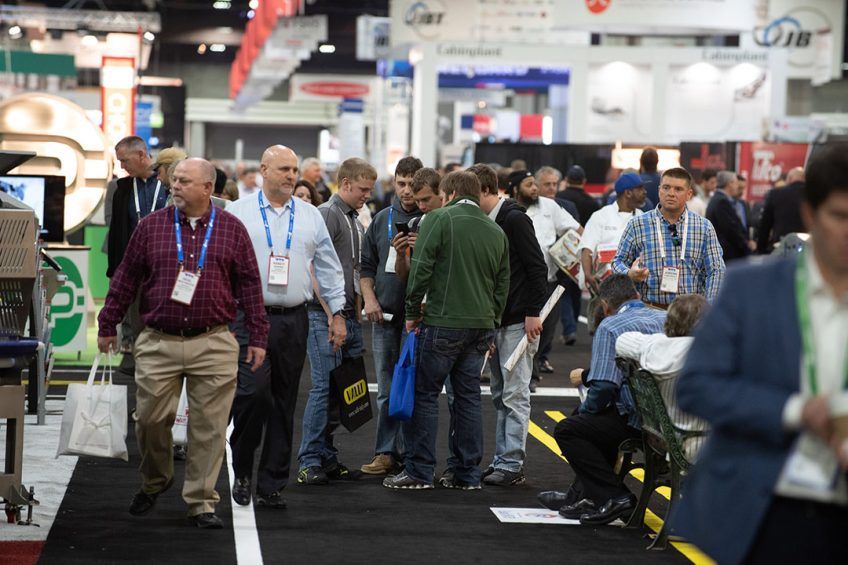4 reasons to attend the IPPE show

The International Production and Processing Expo (IPPE) is the world’s largest trade fair for the poultry sector, covering every element of the supply chain from feed to processing and packaging. Here, Poultry World looks at what to expect from this year’s event.
Covering just over 5 hectares, the International Production and Processing Expo is the world’s biggest show for the global poultry sector and attracts some 32,000 visitors every year. Attendees can explore almost 1,500 trade stands, choose from more than two hundred hours of seminars and benefit from numerous networking opportunities. It’s no wonder that many businesses choose this show to launch new products onto market.
| Dedicated Poultry World seminars The truly global publication Poultry World will be hosting two seminars at the IPPE, one on Poultry Precision Farming and one on Nutrition and Health. Poultry World, together with renowned partners and independent speakers, will be sharing the latest developments and trends in Precision Livestock Farming (PLF) on Tuesday 28 January from 12.00 noon. This seminar will focus on technical systems and big data, as well as smart strategies in precision feeding and nutrition. The seminar on Nutrition and Health will take place the next day, on Wednesday 29 January, also from 12.00 noon. In association with dedicated partners we will delve more deeply into the relationship between nutrition and health. The seminar will highlight the impact of feeding strategies on the gastrointestinal tract and hence the overall health of the bird. Registration for both seminars is free. You can go to poultryworld.net/ippe to register now. |
The event itself – which is held every year in Atlanta, Georgia, in the US – comprises three separate shows: the International Feed Expo, the International Meat Expo and the International Poultry Expo. While a major show for the US poultry sector, it also attracts a broad international audience. Last year 8,315 visitors attended from more than 133 countries. The next show takes place from 28-30 January 2020 at the Georgia World Congress Centre in Atlanta, Georgia. It is organised by the US Poultry and Egg Association with the proceeds of the show going back into the American poultry industry to help fund things like research, education, crisis management assistance, public relations and regulatory assistance.
Four reasons to attend
 Exhibitors
Exhibitors
All the major global suppliers to the poultry sector are present at the IPPE. From genetics giants and feed specialists to processing experts. The exhibits are spread over three halls, with Hall A given over to feed equipment and animal feed ingredients. Hall B showcases meat and poultry processing and packaging, while Hall C has genetics, incubation, live production, as well as egg production and processing equipment on show. Finding your way around is easiest using the IPPE mobile App, available from November from either the iTunes or Google Play stores. Paper programmes are also available.
It’s always worth looking out for smaller exhibtors with unusual or exciting new products that may make you do business differently. In recent years companies selling predatory insects for biological pest control or novel low-cost solar systems that capture the sun’s energy, for example, have been spotted among the bigger exhibitors – and with a record-
breaking number of 1,426 trade stands last year, finding something new is highly likely.
| Registration For the 2020 show the ‘Early Bird’ registration fee of US$ 75 ends on 10 January 2020. The regular price of US$ 125 applies from 11 January. Companies that are members of the American Feed Industry Association; the North American Meat Institute or US Poultry & Egg Association, which process meat, poultry and eggs or manufacture animal feed or pet food, may qualify for the ‘Members to Atlanta (M2A)’ programme that offers free registration. Select your company when registering to see if you are eligible. Poultry growers can also benefit from tickets discounted to as little as US$ 5 on the door. They will require a completed registration form and a 2020 Grower Days coupon. International visitors requiring a visa should contact the US embassy in their country. Letters of invitation are available following completed and processed registration. |
 Education
Education
Running parallel with the show is a comprehensive range of seminars and workshops for attendees to get stuck into. Some are free, including a market intelligence update. Others range from seminars on connecting with consumers about meat production, to managing a modern farming family business. For those looking for more detail or specialist subjects, a range of fee-based forums are available on topics as diverse as managing product recalls to worker safety.
This year will feature a new education programme on Processing for Antibiotic-Free Production focusing on elements that ensure appropriate antibiotic-free production from grow out to plant processing. The two-day workshop will be presented jointly by the US Poultry and Egg Association and the University of Georgia’s Department of Poultry Science. It is highly topical, as about half the poultry in the US is produced in an antibiotic-free system, meaning that additional measures must be taken to reduce the prevalence of Salmonella and Campylobacter. And this year, Tech Talks will offer short informative presentations from exhibitors on operational and technical issues critical to the feed, meat and poultry industries.

 Networking and social activities
Networking and social activities
A wide cross-section of visitors from the United States, South America, Europe and Asia make the IPPE a great place to make new acquaintances in the poultry sector. And there are several opportunities to do so. A great place to start is with the Welcome Reception at the Georgia Aquarium – tickets are free but must be picked up from the Welcome Reception ticket booth in the B or C Building lobbies. They will be available on a first-come first-served basis from Monday at 12.00 noon and Tuesday at 10.00 am. There are other social networking opportunities throughout the show – lookout for the hot wing competition where participants compete in rounds to eat ever-hotter chicken wings. On Wednesday, some of Atlanta’s best chefs will be preparing their favourite beef, pork and poultry recipes for visitors to try.
Featured free seminars • Current Poultry Research and Findings: Information you need to know to help your business • Poultry Market Intelligence Forum • Ergonomic Improvements in the Poultry Industry • Connecting with Consumers About Meat |
 Learn more about the US poultry industry
Learn more about the US poultry industry
America’s poultry industry is the world’s largest and the IPPE is a great place to start learning more about it. The integrated model of poultry production has its origins in the US and is most developed there. Modern broiler production as it exists today is generally thought to have begun in Delaware. At the IPPE you will find trade stands and attendees representing the smallest family businesses, all the way up to the biggest integrators. Today, the country produces a staggering nine billion birds a year, about 17% of which are exported abroad.
Birds are typically grown for 46 days to a weight of 2.7kg and stocked at 37kg/m². Standards differ from Europe and other regions in that litter is commonly recycled, rather than cleared after every crop. Americans eat 42kg of chicken per capita a year – the highest in the world – and during the Superbowl (which is usually within a week of the IPPE) they consume more than 1.3 billion chicken wings. The country is also the world’s largest exporter of poultrymeat, sending chicken predominantly to Mexico, Angola, Taiwan, Cuba and Canada.
 Beheer
Beheer




 WP Admin
WP Admin  Bewerk bericht
Bewerk bericht